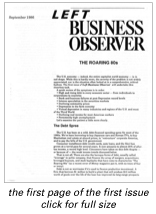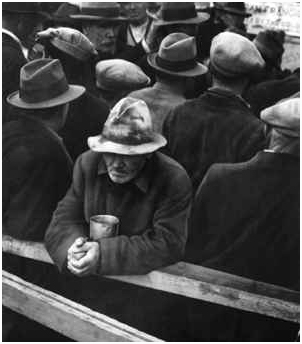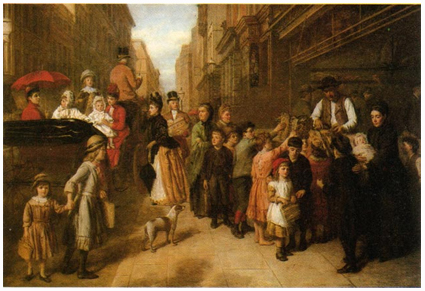
Home Mail Articles Supplements Subscriptions Radio
The following article appeared in Left Business Observer #114, January 2007. It retains its copyright and may not be reprinted or redistributed in any form - print, electronic, facsimile, anything - without the permission of LBO.
LBO at 20
LBO published its first issue in September 1986—the exact date is lost in the mists of history—which makes it 20 years old. (Please don't do the math to figure out how many issues behind schedule we are.) That debut number, written in the late middle period of the Roaring Eighties, was a naïve affair, full of worries about a rerun of 1929.
A little more than a year later came the great crash of October 19, 1987, when the Dow lost 508 points in a single day. It seemed to confirm those worries about a rerun. Early issues mocked the smooth voices of bourgeois reassurance, summoning the ghosts of Hoover and Mellon.
But it wasn't only economic crisis that seemed inevitable—so did some sort of political confrontation. In fact, they seemed bound together: you couldn't transfer that much money upwards and that much insecurity downwards without having some kind of economic and/or political smashup. Either falling incomes would have to undermine an economy so thoroughly dependent on mass consumption, or people would get fed up with "working harder for less," as the New York Times once admiringly described the U.S. economic model.
The crackup didn't happen, and neither did the rebellion. Bush 41 succeeded Reagan, and while the economy stagnated for most of his reign, it never imploded. The crash turned out to be an arresting overture to a melodrama that would never unfold.
But what did unfold was a series of bubbles alternating with bailouts, and along with it increasing polarization (not just on a local and national scale but on a world scale as well) and uncertainty. Economic anxiety, once the concern of the poor and marginally employed, moved up the social ladder through the 1980s and 1990s, through good times as well as bad. Much of this was no accident, as the vulgar Marxists used to say; polarization was the result of an intensified system of reward and punishment, in which success (in maximizing profits, that is, not in improving the human condition) was to be met with showers of money and failure, ultimately, with life on the sidewalk.
All that evoked minimal howls of protest. The Clinton years brought a burst of prosperity, but based essentially on an unsustainable bubble. Politically, it marked the Democrats' final break with even the mildest form of social democracy; it was the era when the market was democratized and everyone could get rich. Faced with this, radical politics got interesting, culminating in the ecstatic WTO Week in Seattle in late 1999. But that moment couldn't survive the grimness of Bush, recession, and 9/11. It seemed like the antiwar movement could be Seattle's revival, but it mostly fell apart once the war began.
Yeah, the election of 2006 did spank the Republicans pretty hard, and few spankings have ever been more deserved. But the agents of the spanking were a Democratic party with no political vision save a vague opposition to the Iraq war (if that, even) and a vaguer still economic "populism" (ditto). Populism is almost always by definition vague; it rarely has an analysis more profound than "somebody's ripping us off," nor a prescription more detailed than a change of personnel. Some resentment against "trade agreements" was mobilized, but legal documents like NAFTA have a lot less to do with the world that has emerged over the last couple of decades than the relentless lowering of transportation and communications costs, which have made global production networks possible, and the deliberate attacks on unions and welfare states. It's not likely the Dems are going to do much about those things—less likely, in fact, than they are to name a date by which to begin a withdrawal from Iraq.
But then again, it's not like the American people are clamoring for an economic renovation. Which isn't the outcome I'd expected when I started this newsletter twenty years ago. I'd thought that the experiment with right-wing economics would either lead to smashup or rebellion. Neither has yet come to pass.
When I first started this newsletter, I also thought that all "we" needed to do was get the facts out there and the politics would eventually sort themselves out. People were either under- or misinformed, and a "better empiricism," as an old friend of the newsletter once put it, would do the trick. If only life were so simple. It's become clear over the last twenty years (to me, that is) that facts often matter little in politics; that ingrained "common sense" or the eagerness to believe what one wants to believe often takes precedence over rational argument. You can tell people that the U.S. is the most income-polarized society in the First World and that our economic mobility is no greater than Old Europe's—if you get the chance to tell them, that is—and they either won't believe you, or they'll quickly forget what they've just learned. Because, as everybody just knows, class distinctions don't matter in America because we're so fluid, and we're all middle class anyway, except maybe Bill Gates and that troublesome urban underclass.
Crash politics
Let's get back to the 1987 crash, and the smashup that didn't happen. In 1991, this newsletter predicted that the 1990s would not be a rerun of the 1930s after all. Banks were failing, indebted corporations were going under, but things never cascaded into crisis like they did sixty years earlier. A friend who's a long-time LBO reader wrote me a "say it ain't so!" letter. He was hoping for a smashup and was disappointed to hear me say it wasn't going to happen.
What is it with people on the left? So eager to put 30 million people out of work—the modern equivalent of the 1929–32 rise in unemployment—to make a political point! I can understand the temptation of looking to some big smashup—in many ways, the 1930s stand out as a period of enlightenment and innovation in American politics. I guess leftists are always hoping that some kind of crisis will once again lift the scales from people's eyes, and a lot more quickly than conventional agitation, organization, and education ever will. (Or as Edmund Wilson said after the 1929 crackup: "One couldn't help being exhilarated at the sudden unexpected collapse of that stupid gigantic fraud.") But what guarantee would there be that people would look to humane collective action in a crisis? They could just as easily fall in step with jackbooted xenophobes.
I can understand the temptation of looking to some big smashup—in many ways, the 1930s stand out as a period of enlightenment and innovation in American politics. I guess leftists are always hoping that some kind of crisis will once again lift the scales from people's eyes, and a lot more quickly than conventional agitation, organization, and education ever will. (Or as Edmund Wilson said after the 1929 crackup: "One couldn't help being exhilarated at the sudden unexpected collapse of that stupid gigantic fraud.") But what guarantee would there be that people would look to humane collective action in a crisis? They could just as easily fall in step with jackbooted xenophobes.
In any case, the lesson I learned from the 1987 crash was that the ruling class had mastered the art of state-led bailouts. Despite all their talk of market discipline, they would never hesitate to mobilize the full resources of government to keep the economy from imploding. Left untreated, an implosion would impoverish the rich—and enough other people to threaten political stability. So the savings & loans were bailed out to the tune of $200 billion, with hardly any public debate—no talk, for example, of turning the failed institutions into democratically controlled development banks. Citibank was quietly nationalized until it could get back on its feet. And Alan Greenspan, that Ayn Rand protégé who never shied away from using the state to rescue troubled capitalists, drove interest rates way down and kept them there, which kept the heavily indebted and their bankers alive. Of course, that round of low interest rates helped launch the stock market bubble of the 1990s. And when that bubble burst in 2000, Greenspan & Co. were there again to push interest rates down even lower. And that round of low interest rates helped launch the housing bubble of the early oughts…ad infinitum?
Maybe the bailout managers' luck won't hold out forever. Handling a serious collapse in the housing market could be a tall order. But it must be said that they've got a pretty good record. We've had many more financial crises in the modern era than they did in the 19th century, but while deep depressions were a common feature of life from the Civil War to the end of the 19th century, they're not anymore (unless you live in Russia or Argentina).
Stability
I'm in the early stages of researching a book on the contemporary American ruling class, and I've recently read several books by a historian who is now rather unfashionable, Richard Hofstadter. A couple of things from Hofstadter that are highly relevant to politics today. One is that the 1930s marked a sharp break in the American political economy—from the competitive, individualistic sort characteristic of the Yankee–Protestant tradition of the 19th century, to a more collective model—driven by crisis, of course, but one also more appropriate to an increasingly diverse and complex society. For some time, well into the 1970s, that looked like a permanent change. Sure there were some rear-guard actions, like the Goldwater campaign of 1964, but the tide of history was better expressed by Richard Nixon, when he proposed a guaranteed minimum income and declared that "We're all Keynesians now."
Who knew that Nixon's declaration was an epitaph, not a victory statement? Who could have guessed that the 19th century Yankee–Protestant model would return with such a vengeance? But a lot of the class-warfare-from-above of the Volcker–Reagan era was essentially a mission to restore that old order, and it's been pretty successful. The toughest nut hasn't yet been cracked—privatizing Social Security—but maybe we'll have to wait for the presidency of that Yankee–Protestant Hillary Clinton to get that job done.
Pieties
But why has the class war been so easy? Why has there been so little resistance? There are several reasons, among them the atomization and political disengagement of the American masses. But I'd also want to emphasize the durability of that Yankee–Protestant tradition in the culture. Tom Frank created a big splash with his book, What's The Matter With Kansas?, which argued, among other things, that the white working class has been hoodwinked by Republican culture warriors into voting against their economic interests. As engaging as the book is—Frank is a very smart and witty writer—it has several problems. One, not relevant to the topic at hand, is simply that Kansas has been one of the most reliably Republican states in the country for the last 100 years (at least until 2006 brought some Republican defeats).
But there's more. In a paper called "What's the Matter with What's The Matter with Kansas," Princeton political scientist Larry Bartels shows that outside the South, the white working class has not moved Republican, that cultural issues do not trump economic ones—but that large numbers of white voters actually like Republican economic policies. (Bartels' work is based on the American National Election Study, a rigorous poll done after every election since 1948.) That brings us back to Hofstadter, who made the now largely forgotten point that American Protestants have long had a deep sympathy for The Market. Since they see humans as fallen, corrupt creatures always in need of a good kick in the ass, they revere it as a wonderful mechanism of social discipline, punishing the lazy and rewarding the hard-working. If people are poor, it's because they're immoral, impatient, or wasteful. I'm certainly not arguing that the market really does punish those who deserve it, or rewards society's winners in a fashion commensurate with their social contribution. (What moral virtues are exhibited by a hedge-fund manager who pulls down $150 million a year while women who care for other people's children toil for minimum wage?) But the fantasy that it does explain why there's been so little political price paid for the economic march back to the 19th century.
 I'll confess that for a moment or two after the dot.com bubble burst, and Enron and the other corporate scandals were revealed, I'd hoped there might be some moment of magical awakening. But it didn't happen that way. And the reason it didn't happen was well anticipated by C. Wright Mills in The Power Elite. Writing of the routinization of crisis and scandal, Mills declared there was really no energy for sustained or productive outrage: "[A]mong the mass distractions this feeling soon passes harmlessly away. For the American distrust of the high and mighty is a distrust without doctrine and without political focus; it is a distrust felt by the mass public as a series of more or less cynically expected disclosures."
I'll confess that for a moment or two after the dot.com bubble burst, and Enron and the other corporate scandals were revealed, I'd hoped there might be some moment of magical awakening. But it didn't happen that way. And the reason it didn't happen was well anticipated by C. Wright Mills in The Power Elite. Writing of the routinization of crisis and scandal, Mills declared there was really no energy for sustained or productive outrage: "[A]mong the mass distractions this feeling soon passes harmlessly away. For the American distrust of the high and mighty is a distrust without doctrine and without political focus; it is a distrust felt by the mass public as a series of more or less cynically expected disclosures."
It gets hard to sustain energy and enthusiasm for any left political project (even a critically successful newsletter) in a political culture that seems so immune to its appeal. You'd think that the idiocies and depredations of the last 25 years might excite some kind of critical or venturesome spirit, but so far, no luck. Maybe the American public is too well off—subject to innumerable risks and anxieties, for sure, even among the putatively affluent—to want to shake things up much. But even things that shouldn't involve much shaking, like national health insurance, seem only slightly less impossible than total revolution.
The 2006 election
The November election did not, as many liberals are breathlessly claiming, represent a move to the left, except in the most relative terms. Much of the electorate despises conflict, and has a naïve idea that politics isn't about struggles over principles and material shares, but working for the common good. But in many areas of political life there is no common good. The normal operation of the economic system requires that some do badly so that a few do well, and any attempt to redress that imbalance is going to provoke conflict. There's no painless way to make the poor less poor or the middle more secure; people at the top will have to be expropriated. It's very hard to say that in public in the USA.
Nor is there any way that this election could be seen as an embrace of the Democrats, except in the sense that they were the not-Republicans. The instinctive split-the-difference centrism of the American middle ranks was offended by the "extremism" and "partisanship" of the GOP, which is another way of saying that the Republicans believe in something, however noxious and loony, and fight hard for it. The very mushiness of the Dems served a useful purpose; by not standing for anything more substantial than a little less war in Iraq, they served as a palatable alternative to a Republican party that is now held in lower esteem than it was during the Watergate years. According to Democratic pollster Stan Greenberg's operation, the Dems "ended up being viewed more negatively during this election than in 2004…. Democrats made big gains, but they are surely not revered. [They] have only modest advantages—and are chosen by fewer than 50 percent—on key attributes such as being 'on your side', 'future-oriented' and 'for families'. The parties are evenly divided on 'shares your values', unchanged from January 2005."
Broader attitudes are slightly more communitarian than they were a few years ago—Republicans have given competitive hyperindividualism a bad name—but not by much, and there's still enormous skepticism about the public sector's potential to play a constructive economic role. On certain specifics, the public approves of a more active government role, especially alternative energy development—which is a good thing, because private capital is never going to do that work (at least until the government funds the basic research that might eventually make private profit on alt.energy feasible), and if no one does it, we may burst into flames, if we don't drown first.
Comfort
But now I've pretty much written myself into a cul-de-sac of gloom. And when one is in such a state it's easy to forget a few cheering things. One is, as Noam Chomsky put it in an interview on my radio show in 2002, the country is "incomparably more civilized" than it was in the early 1960s, when there was no objection to JFK's escalation of the Vietnam war, racism was far more virulent, and when there were no feminist, gay, and environmental movements to speak of. Now, public opinion turned against the Iraq war more than twice as fast as it did against Vietnam; voters rate themselves as more feminist than the Democratic party; a majority (just barely—51%) told Stan Greenberg's pollsters that "homosexuality is a way of life that should be accepted by society"; and two-thirds of the public also tells Greenberg & Co. think the government should spend serious money on alternative energy research. This is not utopia—the transformation of property relations isn't on the list—but it's something to work with. Maybe if there's an "LBO at 30," the tone will be rather more upbeat.
Home Mail Articles Stats/current Supplements Subscriptions Radio